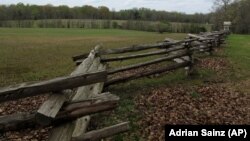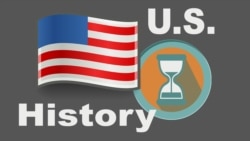From VOA Learning English, this is The Making of a Nation. I’m Kelly Jean Kelly.
And I’m Christopher Cruise.
Confederate forces won the first major land battle of America’s civil war in July 1861. The Confederates defeated Union forces at Manassas, or Bull Run, in Virginia, less than 50 kilometers from Washington, DC. Union leaders quickly built a large army to defend the capital.
At the same time, Confederate and Union troops battled in the western United States. One of the Union generals in the west was Ulysses Grant.
Ulysses Grant had fought in America's war against Mexico and had won honors for his bravery. When that war ended, he was sent to an army base far from his wife and children. He did not like being without them. Some say he became depressed and drank too much alcohol. In 1854, he left the army.
When the Civil War started, the Union needed experienced officers. After Grant successfully organized a group of unpaid soldiers in Illinois, a member of Congress helped him receive an appointment as a Union general.
Grant believed he could force Confederate soldiers to withdraw from Kentucky and Tennessee. Then he could march directly into the Deep South -- Mississippi.
Two Confederate forts stood in Grant's way. The first, Fort Henry, fell easily. At the second, Fort Donelson, fighting lasted several days.
Finally, the Confederate commanding officer asked General Grant the terms of surrender. Grant's answer was simple. "No terms except an unconditional and immediate surrender can be accepted."
The Confederates gave up Fort Donelson. It was the greatest Union victory since the start of the war. Ulysses Grant was a hero. Newspapers called him "Unconditional Surrender" Grant.
Confederate forces moved south and re-grouped at Corinth, Mississippi. Grant followed with 40,000 men. He stopped about 30 kilometers from Corinth, near a small church called Shiloh Meeting House. There, he waited for an additional force of Union soldiers under the command of Don Buell.
Confederate General Albert Sydney Johnston was waiting, too. He had more than 40,000 men, about the same as Grant. And he was expecting another 20,000. But when he learned Grant was nearby, he decided not to wait. On April 6, 1862, Confederate forces attacked and surprised the Union army.
The fighting at Shiloh was some of the bitterest of the war. It was not one battle, but many. Groups of men fought each other across the wide battlefield. From a distance, they shot at each other. Close up, they cut each other with knives. The earth became red with blood. The dead and wounded soon lay everywhere.
At first, the Confederates pushed Grant's Union army back. But in the thick of the struggle, General Johnston was shot in the leg. The bullet cut through an artery. Johnston bled to death before help arrived.
By the time the fighting began again the next day, General Buell’s force arrived to help Grant. The Confederate army pulled back. The Union army let it go.
Shiloh. The word itself came to mean death and destruction. Over 100,000 men fought. More than 23,000 soldiers were killed, wounded or missing.
One soldier who fought there said: "It was too shocking, too horrible. I hope to God that I may never see such things again."
At first the North celebrated the news of its victory. But the public quickly became angry when they learned of the heavy losses. People blamed General Grant. They demanded President Abraham Lincoln dismiss him.
But the president said Grant was too important. “I can’t spare this man,” Lincoln said. “He fights."
I’m Christopher Cruise.
And I’m Kelly Jean Kelly.
This is The Making of a Nation with VOA Learning English.
______________________________________________________________
Words in This Story
unconditional - adj. not limited
re-grouped - v. stopped for a short time and prepared for something difficult
artery - n. a tube that carries blood from the heart to all parts of the body
shocking - adj. causing a sudden feeling of horror or disgust
spare - v. give up
Now it’s your turn to use these Words in this Story. In the comment section, write a sentence using one of these words and we will provide feedback on the use of vocabulary and grammar.







